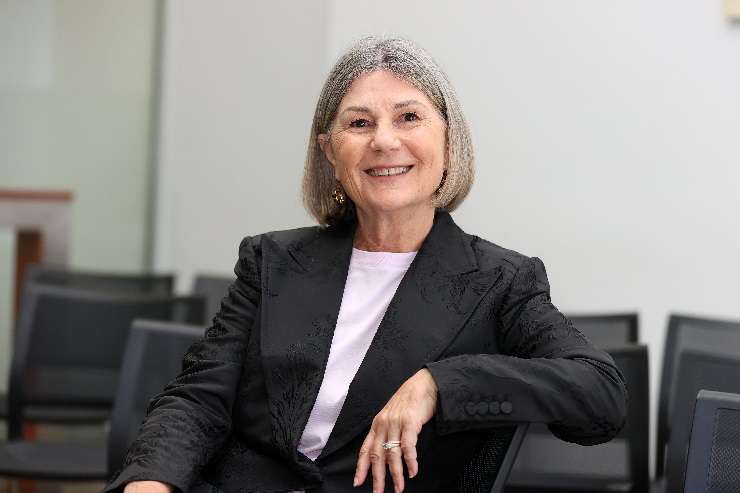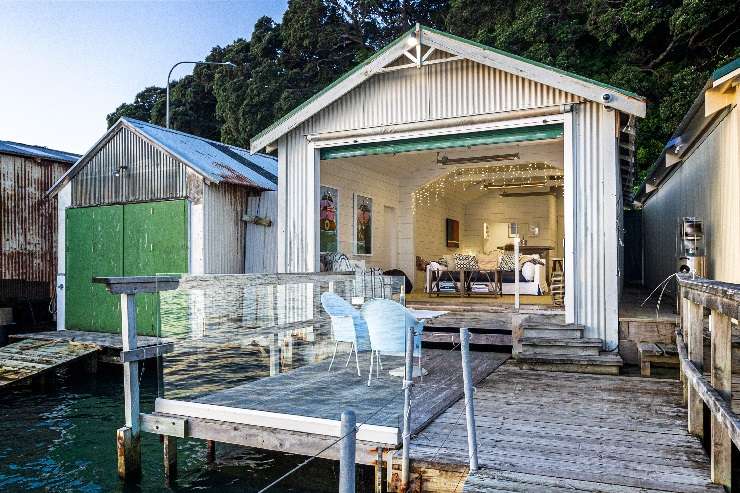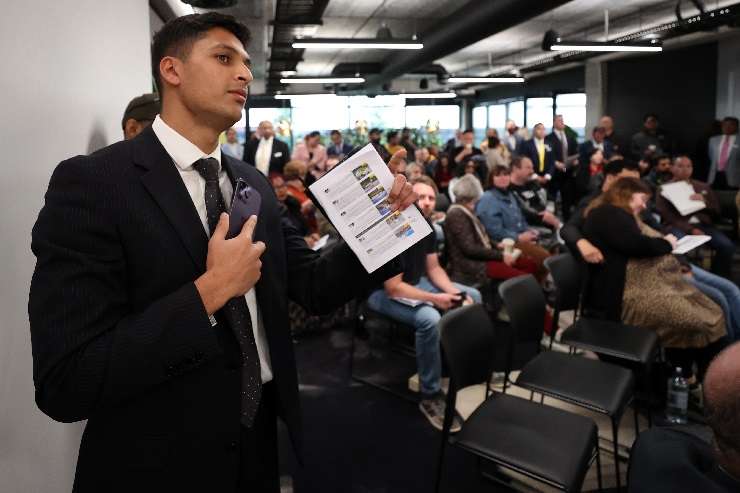Auctions went from not to hot in a rollercoaster year on the auction floor, although the ups and downs were mostly seen in Auckland.
Shane Cortese, Harcourts national auction manager, likens Auckland auction rooms to the wild west coast beaches with big crashing waves while the rest of the country was more like the rolling waves of the eastern beaches.
“I feel like Auckland’s been a real test case for the market,” said Cortese.
At the start of the year the country’s biggest city was “really tough” across all sales methods, not just auctions.
Start your property search
“Everything slowed to a crawl and properties were taking longer to sell.
“We were passing in a lot of properties and it took a long time for people to come to the realisation the market had changed up here – we had been flying pretty high for a couple of years.”
Cortese said 18 months ago – at the height of the post-Covid boom – properties were selling for prices more likely to have been reached in 2024 and 2025, so when prices came back early this year it looked as if they had come down dramatically, but that wasn’t the case.
“They had actually just carried on in their normal trajectory if we hadn’t had that massive peak.”
As well as owners finding that hard to get their heads around, the market was also impacted by uncertainty around interest rates, inflation and the economy.
Read more:
- Tony Alexander: Nearly half of all buyers right now are looking for lower-priced homes
- ‘Please don’t intimidate each other’: Buyers told to behave at heated auction
- Auckland apartments sell for less than $50,000, so why was the vendor over the moon?
“When you think if people borrowed $1 million a year and a half ago it was costing them $27,000 a year to repay, and it’s now costing them $83,000 a year to repay so that had a real massive influence on the market.”
However, once everyone came to grips with “this is how it’s going to be now” the market started to improve and by July competition for properties had increased.
“I've seen it sort of move from zero in that February, March, April period through to one bidder, two bidders and four and five.”
Cortese said auctions were now looking healthy with more bidders being seen in Christchurch, Wellington, Tauranga and Hamilton, and that pre-auction offers have started to come back with some ferocity.
That suggests people thought the market had reached the bottom and, after holding back, were prepared to make their moves, including plenty of first-home buyers.
“I've sold more properties on the auction floor to first-home buyers than I have in a long, long time.”

Barfoot & Thompson auctioneer Marian Tolich says a lot of conditional sales are falling over. Photo / Fiona Goodall
Barfoot & Thompson auctioneer Marian Tolich has also seen more tears of joy from first-home buyers in a while, which she puts down to the lack of competition from investors for much of the year.
She has also noticed a lot of people auctioning their homes to leave for Australia, and Perth in particular, where there are good jobs and the housing is cheaper.
“You can buy a pretty amazing five bedroomed single level home over there for $1.5m.”
Tolich said auctions were slow through to around August/September when the success rate upped from around 20-30% at the start of the year to 70%.
The relaxing of various rules meant people were able to get finance organised more quickly and a lot more sales were seen in the $700,000 to $900,000 price range.
Sales of small development sites with room for three or four terraced houses also picked up, possibly because developers were eyeing immigration numbers and anticipating a need for more housing.
“Maybe they’ve finished projects they were doing and have had trouble selling, because at one stage there seemed to be quite a lot of new-builds on the market and maybe they’ve sold now and people are looking for the next wave and knowing that all of the compliance takes a while to get underway.”
She also noticed a lot of conditional deals falling over, saying vendors prefer auctions as they get a cash offer and the winning bid is unconditional – conditional deals have tended to include a gamut of conditions, from a builder’s report, a LIM report, getting finance, solicitor’s approval and due diligence.
“At least with an auction it’s cash unconditional and it might be less maybe than what the owners were hoping for but at least they know it’s done.”

The year saw a luxury boatshed, in Auckland, sell under the hammer for more than what most home homes did. Photo / Supplied
Tolich said there was a buzz back in auction rooms and more auctions were being held. “I guess from the beginning of the year when we perhaps had four or five auctions in a session now there’s between 17 and 24, and out south (Auckland) has gone gangbusters as well.”
A prime example of the extra heat in the market is the auction sale of a boatshed in Auckland’s Orakei. The Hobson Bay shed, which was used in the hit TV show David Lomas Investigates, fetched $2.05m in June – more than what most Kiwi homes are worth.
The price is the highest achieved for a boatshed listed on the open market in New Zealand, and, according to Johnathan Sissons, managing director of New Zealand Sotheby’s International Realty in Remuera, which handled the sale, points to plenty of disposable income around.
Sissons said the people who bought and sold the boatshed were in that top level of the luxury market, and that at least six people made bids with two waging a “ding-dong” battle. “Whilst it’s not a home it’s an exorbitant amount of money to spend on a boatshed,” he said.
Ray White’s lead auctioneer Sam Steele, who travels the country to hold auctions, said the market was a lot more active in recent months compared to last year, be that Christchurch, Wellington or Tauranga.
Nationwide, the Ray White success rate to the end of September was over 50% compared to around 40% last year, and the number of bidders were up about 30%.
The agency found success in July with its mega-auction event in South Auckland. It had 57 properties on the slate, and sold 38 of them for a total of close to $32m, as more than 250 bidders tried to realise their real estate dreams.
Steele said a market to watch was Wellington where auctions have become more popular.

Bidders and agents in action at Ray White's mega auction in July. Photo / Fiona Goodall
Wellington has traditionally favoured other sales methods but various agencies have been pushing auctions and Steele said the number of Ray White auctions more than quadrupled compared to last year, and there was a big jump in the success rate to 75%.
“It’s a market with so many opportunities when it comes to auctions and we’re starting to see our businesses now really drive home the auction message and having great success with it as well.”
As of August, the average days on the market for Ray White auction sales was down to just 23, compared to private treaty sales which took double the time to sell.
“We haven’t seen days on market for auctions in the early 20s since we last had a boom so I think that definitely tells us the market is in a positive position because properties are not sitting on the market.”
Conor Patton, national auction manager for Bayleys, also said Auckland was the first to notice market changes.
“Auckland experienced a greater price drop and drop in activity earlier in the year than other parts; certainly more than Christchurch and Queenstown and other places.”
Aucklanders borrow a lot more for houses, he said. “They’re (interest rates) more acutely felt I think. If you’ve got a mortgage of $1.5m you’re going to notice it more than if you’ve got a mortgage of $500,000.”
That made Auckland pretty quiet compared to Christchurch, for example, where the market has been more stable.
Christchurch did see big growth in 2021 but off a lower base and the year-on-year price change was quite minor compared to Auckland and Wellington, Patton said.
Queenstown, too, didn’t stall the way Auckland did. “Queenstown has been one of the standout performers in the market in the sense their prices and activity have held quite strong.”
Hawke’s Bay was affected by the cyclone early in the year and that has been the area’s biggest hurdle, although auctions were starting to pick up in September.
Gisborne was light on volume but had a steady success rate, while up in Northland the market has been slow with low listings numbers.
With Auckland picking up and fierce bidding being seen once again for some properties the auctioneers are all expecting a busy few months.
- Click here to find properties for sale




















































































